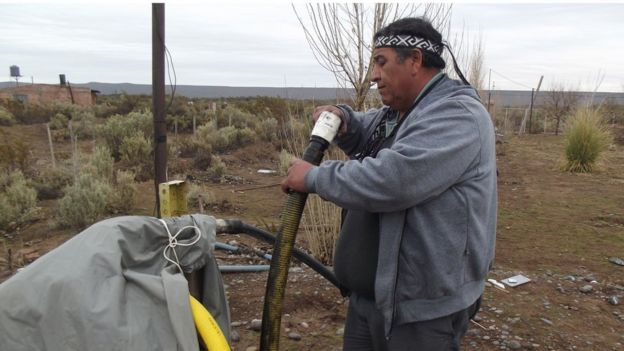By Cintia Garcia
Impunity Watch Reporter, South America
Buenos Aires, Argentina—Large oil companies are facing resistance against fracking from the Mapuche indigenous community located in the northern Patagonia region of Argentina. The Mapuche are claiming that their natural resources are being polluted as a result of gas extraction techniques.

The region targeted by the oil companies is known as Vaca Muerte in the northern province of Neuqen. It is the second largest hydrocarbon reserve in the world following the United States according to the U.S. Energy Information Agency. But the region is also home to various indigenous families who claim that the pollution is contaminating their drinking and farming water. Albino Campo, the leader of a Mapuche community, Lof Campo Maripe, told BBC that, “The Mapuche people are angry. We feel like they have enslaved our land. It’s as if someone came into your house without asking. They have contaminated everything.” Campo also stated that their pipes and water used to be clear, but now the pipes are covered with black grease. In addition to black pipes, the water deposited from the pipes contains murky residue. The Mapuche also claim that the contaminated water is causing birth defects among their farm animals. According to BBC, Conservationist groups are also joining the movement demanding an end to fracking in indigenous territory, farming land, nature reserves, urban areas, and sites near water resources such as rivers, lakes, and lagoons.
The Vaca Muerte region is enticing for oil companies because it is an opportunity for Argentina to become self sufficient for many years to come. Fracking in the area could extract enough oil to cover the demands in Argentina providing cheap energy. Pro-government Congressman Eduardo Amadeo stated that, “Argentina needs oil and gas. You cannot stop production for 45 million people because one or two thousand people feel that their rights are affected.” The YPF and Chevron have the strongest partnership in the region. Chevron has agreed to invest 16 billion in the development through its partnership. YPF and Chevron have drilled 420 wells and are expected to drill 200 more. The companies have denied the allegations of contamination.
For more information, please see:
BBC—Mapuche Community in Argentina Fights Fracking Site—5 September 2016
Humanosphere—Argentina’s Indigenous Communities Unite to Stop Fracking—7 September 2016
Telesur—Mapuches Fight Back Agaisnt Fracking in Argentine Patagonia—7 September 2016